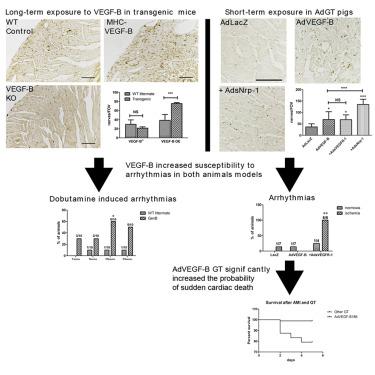Molecular Therapy ( IF 12.1 ) Pub Date : 2020-03-19 , DOI: 10.1016/j.ymthe.2020.03.011 Johanna Lähteenvuo 1 , Olli-Pekka Hätinen 1 , Antti Kuivanen 1 , Jenni Huusko 1 , Jussi Paananen 1 , Markku Lähteenvuo 1 , Jussi Nurro 1 , Marja Hedman 2 , Juha Hartikainen 2 , Nihay Laham-Karam 1 , Petri Mäkinen 1 , Markus Räsänen 3 , Kari Alitalo 3 , Anthony Rosenzweig 4 , Seppo Ylä-Herttuala 5

|
VEGF-B gene therapy is a promising proangiogenic treatment for ischemic heart disease, but, unexpectedly, we found that high doses of VEGF-B promote ventricular arrhythmias (VAs).
VEGF-B knockout, alpha myosin heavy-chain promoter (αMHC)-VEGF-B transgenic mice, and pigs transduced intramyocardially with adenoviral (Ad)VEGF- B186 were studied. Immunostaining showed a 2-fold increase in the number of nerves per field (76 vs. 39 in controls, p < 0.001) and an abnormal nerve distribution in the hypertrophic hearts of 11- to 20-month-old αMHC-VEGF-B mice. AdVEGF-B186 gene transfer (GT) led to local sprouting of nerve endings in pig myocardium (141 vs. 78 nerves per field in controls, p < 0.05). During dobutamine stress, 60% of the αMHC-VEGF-B hypertrophic mice had arrhythmias as compared to 7% in controls, and 20% of the AdVEGF-B186-transduced pigs and 100% of the combination of AdVEGF-B186- and AdsVEGFR-1-transduced pigs displayed VAs and even ventricular fibrillation. AdVEGF-B186 GT significantly increased the risk of sudden cardiac death in pigs when compared to any other GT with different VEGFs (hazard ratio, 500.5; 95% confidence interval [CI] 46.4–5,396.7; p < 0.0001). In gene expression analysis, VEGF-B induced the upregulation of Nr4a2, ATF6, and MANF in cardiomyocytes, molecules previously linked to nerve growth and differentiation. Thus, high AdVEGF-B186 overexpression induced nerve growth in the adult heart via a VEGFR-1 signaling-independent mechanism, leading to an increased risk of VA and sudden cardiac death.
中文翻译:

过度表达VEGF-B的心肌对心律失常和交感神经生长的敏感性。
VEGF-B基因疗法是治疗缺血性心脏病的一种有希望的促血管生成疗法,但是,出乎意料的是,我们发现高剂量的VEGF-B会促进室性心律失常(VAs)。
研究了VEGF-B基因敲除,α肌球蛋白重链启动子(αMHC)-VEGF-B转基因小鼠以及腺病毒(Ad)VEGF-B186在心肌内转导的猪。免疫染色显示,在11至20个月大的αMHC-VEGF-B小鼠的肥大心脏中,每个视野的神经数量增加了2倍(对照组为76对39,p <0.001),并且神经分布异常。AdVEGF-B186基因转移(GT)导致猪心肌中神经末梢的局部发芽(对照中,每个视野中的141个神经对78个神经,p <0.05)。在多巴酚丁胺应激期间,60%的αMHC-VEGF-B肥大性小鼠有心律失常,而对照组为7%,AdVEGF-B186转化的猪为20%,AdVEGF-B186-和AdsVEGFR-的组合为100% 1转导的猪表现出VA甚至心室颤动。与任何其他使用不同VEGF的GT相比,AdVEGF-B186 GT显着增加了猪猝死的风险(危险比,500.5; 95%置信区间[CI] 46.4–5,396.7; p <0.0001)。在基因表达分析中,VEGF-B诱导了心肌细胞中Nr4a2,ATF6和MANF的上调,这些分子以前与神经生长和分化有关。因此,高的AdVEGF-B186过表达通过VEGFR-1信号独立机制诱导成年心脏的神经生长,导致VA风险增加和心脏猝死。以前与神经生长和分化有关的分子。因此,高的AdVEGF-B186过表达通过VEGFR-1信号独立机制诱导成年心脏的神经生长,导致VA风险增加和心脏猝死。以前与神经生长和分化有关的分子。因此,高的AdVEGF-B186过表达通过VEGFR-1信号独立机制诱导成年心脏的神经生长,导致VA风险增加和心脏猝死。











































 京公网安备 11010802027423号
京公网安备 11010802027423号